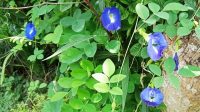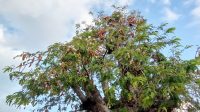NUTMEG is not just a spice with a distinctive aroma. As one of the commodities that colored the history of world trade, nutmeg has historical value, health benefits and extraordinary tourist attractions. In Bali, nutmeg is not only a kitchen ingredient, but also part of a tourist trip that offers a unique experience.
History and Culture of Nutmeg
Nutmeg has a long history as one of the spices that captivates the world. Originating from the Banda Islands, Maluku, nutmeg has been a valuable commodity since the Spice Route era. Historically, nutmeg was considered equivalent to gold because of the high demand in Europe in the 15th to 17th centuries.
In Bali, although nutmeg does not originate from here, this plant has long been a part of people’s lives. Nutmeg is used in religious rituals, traditional ceremonies, and traditional potions. Balinese agrarian culture also uses this plant as a symbol of harmony between humans and nature.
Habitat and Locations of Nutmeg Producers
Nutmeg thrives in tropical areas with high humidity. In Indonesia, the main areas producing nutmeg include Maluku, North Sulawesi, and Aceh. In Bali, nutmeg can be found in several highland areas such as Tabanan and Buleleng, where the climate is suitable for the growth of this plant.
The nutmeg forest in Bali is a unique tourist spot, offering natural beauty as well as education about spice plants.
Uses and Benefits of Nutmeg
Nutmeg has a number of extraordinary benefits as follows:
- Culinary: Nutmeg seeds are used as a cooking spice, while the flesh of the fruit is processed into sweets, syrup, or jam.
- Health: Nutmeg is known to have antioxidant, anti-inflammatory properties, and helps improve sleep quality. Nutmeg essential oil is also used in aromatherapy.
- Beauty: Nutmeg extract is often used in skin care products because of its properties that help overcome acne and premature aging.
Tourism Related to Nutmeg in Bali
In Bali, nutmeg tourism is a special attraction, especially in the Badung, Tabanan and Buleleng areas. Here are the experiences that can be enjoyed:
Educational Tour at the Nutmeg Plantation: Tourists are invited to explore the nutmeg plantation, see the harvesting process, and how to process nutmeg into high-value products. The most famous nutmeg forest is the Sangeh Monkey Forest tourist attraction in Badung.
Nutmeg Processed Product Workshop: You can learn to make candied nutmeg, essential oil, or special nutmeg-based spices.
Traditional Markets and Souvenir Shops: In Bali’s local markets, you can find various nutmeg-based products that are suitable as souvenirs.
Typical Nutmeg-Based Culinary
Bali offers a variety of interesting nutmeg-based culinary delights, such as:
- Nutmeg drink: A warm drink with a calming spice aroma.
- Nutmeg Candy: A traditional snack with a distinctive sweet-sour taste.
- Balinese spice: A typical Balinese dish that uses nutmeg to provide a warm taste and an enticing aroma.
The Uniqueness of Nutmeg
- Multipurpose Plant: All parts of the nutmeg fruit, from the seeds, mace (seed membrane), to the fruit flesh, have high utility value.
- Special Aroma and Taste: Nutmeg has a distinctive warm aroma, suitable for cooking, drinks, and traditional medicine.
- Iconic History: This fruit was once the reason for major wars and trade in the past, making it a historic spice.
Conclusion
Nutmeg is not only captivating in terms of taste and aroma, but also holds a rich story and travel experience. In Bali, nutmeg tourism invites you to dive into the history of spices, enjoy the beauty of nature, and support local wisdom. Explore this destination and experience a unique experience with nutmeg which is full of benefits!











